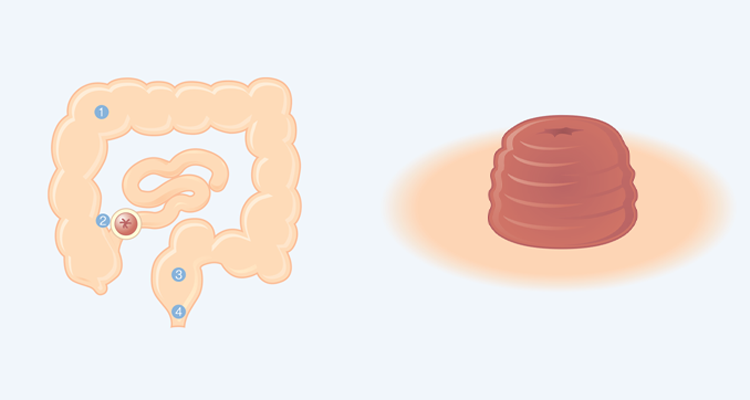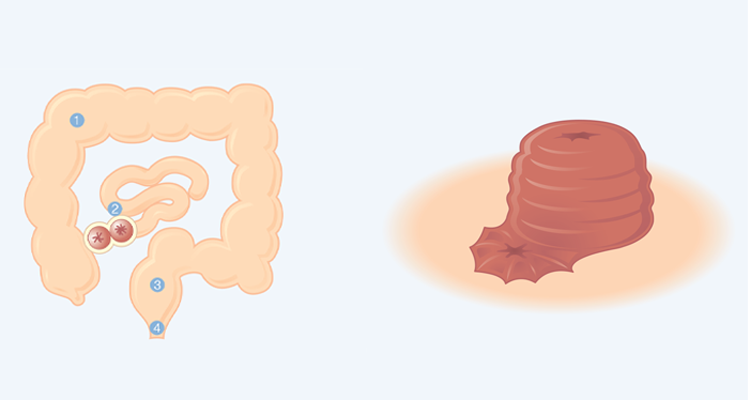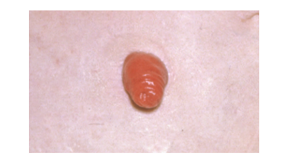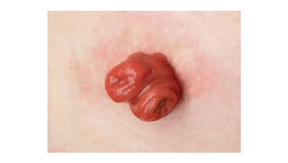What is an Ileostomy?
An Ileostomy is a surgically created opening from your small bowel to the surface of your abdomen. This provides a new path for waste material to leave your body after part of the bowel has been removed.
It can produce output varying from liquid stool to a thick, porridge-like consistency.
Info: An Ileostomy is usually on the right-hand side of your body, but in some circumstances may be formed on the lefthand side.
What are the different types of Ileostomy?
You will either have an end Ileostomy or a loop Ileostomy.
What is an end Ileostomy?
An end Ileostomy is formed when all or part of the large bowel and/or the rectum are removed. Part of the small bowel is brought out to the surface of the abdomen to create a stoma.
An end Ileostomy can be temporary or permanent.

End Ileostomy Diagram:




What happens if a temporary end Ileostomy is created?
If a temporary end Ileostomy is created, a diseased section of large bowel is removed, but the remaining bowel cannot be re-joined at the same time as it is unsafe or inappropriate for your surgeon to do this at this time.
However, it may be possible to re-join your small bowel in the future, and this can be discussed with your surgeon.
What is a loop Ileostomy?
A loop Ileostomy is usually created to protect a surgical join in the large bowel or to divert the flow of stool from an obstruction. It is formed when a loop of the small bowel is brought to the surface of the abdomen and opened to form a stoma. This can be temporary or permanent.
A loop Ileostomy can also be formed to protect the join following reconstruction surgery, such as an Ileo-anal pouch. A loop Ileostomy has two openings; only one of these will pass stool. The other may produce mucus.

Loop Ileostomy diagram:
Large bowel
Ileostomy
Rectum
Anus
Why am I having an ileostomy?
Your ileostomy operation may need to be performed for a variety of reasons and your Surgeon and Specialist Nurse will explain these to you.
There are a number of different diseases and conditions that can result in the need for an Ileostomy, such as:
- Ulcerative Colitis
- Crohn’s Disease
- Diverticular Disease
- Faecal incontinence
- Cancer
- Trauma
- Familial Adenomatous Polyposis
- Radiation damage
- Congenital abnormalities
What will my Ileostomy look and feel like?
Your Ileostomy should protrude from your abdomen, like a spout, and this can vary depending on how it is formed by your surgeon. It will be soft to touch, pinkish-red in colour and moist; rather like the inside of your mouth.
There is no sensation in the stoma, so it is not painful. However, it has a rich blood supply and it is normal for it to bleed a little from time to time, especially when cleaning.
Your ileostomy is likely to be swollen at first and will take a few weeks to reduce in size.
There will be small stitches around the edge of your ileostomy, which will either be dissolvable or your Stoma Care Nurse will remove them 1-2 weeks after your operation.

Helpful videos to prepare you for your ileostomy operation
We have created a series of ‘how to’ video guides for people living with a stoma. These videos are available to view and download.

What to expect after your ileostomy surgery
Find out more information about what you can expect after your stoma surgery including; how your ileostomy works, how to change a stoma bag, taking care of your skin and much more.

.png)









